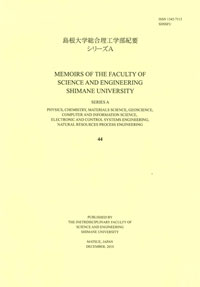島根大学総合理工学研究科
ISSN:1342-7113

number of downloads : ?
Use this link to cite this item : https://ir.lib.shimane-u.ac.jp/5300
Memoirs of the Graduate School of Science and Engineering Shimane University. Series A 37
2003-12-15 発行
スギ生立木における樹液流の通導路(II)
Conductive Passive Way of Sap Flow in Cryptomeria Japonica D. Don Standing Trees(II)
Tanaka, Tooru
Nakai, Takahisa
File
Description
The conductive passive way of sap flow in the trunk of a Cryptomeria Japonica D.Don standing tree was observed by the safranine dyeing. As a result, almost the whole area of the sapwood at the position of 1.5cm higher than the position that injected the safranine (road clearance : 1.7m, H_<1.7>) was stained by safranine. In the white zone near the sapwood, it was recognized that only the latewood stained by safranine. And, in the white zone near the sapwood, only the latewood stained by safranine at the position of 7.4cm higher than H_<1.7>. And more, the safranine dyeing was not accepted absolutely in the white zone at the position of 19.5cm higher than H_<1.7>. As estimated from above results, it was thought that the safranine dying in the white zone occurred by originating from the capillary attraction, and it was not a result of the conduuctive passive of sap flow. Finally, the heartwood at all measuring positions was not stained by safranine.
樹木内の一部の水は,生きた細胞,すなわち根の柔細胞と葉の葉肉細胞を通過するが,大部分の水は,原形質が消失して通導機能を獲得した仮道管や道管を通過する.また,特殊な環境,例えば幹が凍結と融解を繰り返す環境などを除いては,水分は根から葉まで切れることなく繋がっており,蒸散作用によって生じた強い吸水力が,水分を連続的に引き上げている(水の凝集力説).水分の上昇パターンとしては,裸子植物を用いた実験で主に5パターンに分類できると報告されている.すなわち,(A)右回りのらせん上昇型(spiral ascent turning right),(B)左回りのらせん上昇型(spiral ascent turning left),(C)連結上昇型(interlocked ascent),(D)部分らせん上昇型(sectional winding ascent),(E)部分垂直上昇型(sectional straight ascent),である.本年度および昨年度実験に供したスギの場合は,上記のうち右回りのらせん上昇型にあたる.前報では,この上昇する水分の通導経路を,サフラニン染色によって視覚化して詳しく調べた.その結果,辺材部位では,全般にわたって水分通導が確認できたが,上昇速度には部位による差が認められた.すなわち,樹皮側数年輪がほぼ同じ速度で早く,その内側の部位では,白線帯に最も近い年輪を除いてほぼ同じ速度で先に比べ遅かった.また白線帯に最も近い年輪では,前者と後者の領域のほぼ中間的な上昇速度であった.樹皮側数年輪をさらに詳細に調べたところ,最も早い上昇速度の年輪は,当年輪とは限らなかった.一方,心材部位では,染色は全く認められず,水分通導は起こっていなかった.さらに白線帯部位では,若干染色が認められたが,これが蒸散に伴う水分通導によるものであるのか,あるいは毛管張力によるものであるのかをはっきりさせることは出来なかった.
そこで本研究では,昨年に引き続き,スギ生立木のサフラニン染色を行い,特に白線帯部位の挙動を詳しく調べた.
樹木内の一部の水は,生きた細胞,すなわち根の柔細胞と葉の葉肉細胞を通過するが,大部分の水は,原形質が消失して通導機能を獲得した仮道管や道管を通過する.また,特殊な環境,例えば幹が凍結と融解を繰り返す環境などを除いては,水分は根から葉まで切れることなく繋がっており,蒸散作用によって生じた強い吸水力が,水分を連続的に引き上げている(水の凝集力説).水分の上昇パターンとしては,裸子植物を用いた実験で主に5パターンに分類できると報告されている.すなわち,(A)右回りのらせん上昇型(spiral ascent turning right),(B)左回りのらせん上昇型(spiral ascent turning left),(C)連結上昇型(interlocked ascent),(D)部分らせん上昇型(sectional winding ascent),(E)部分垂直上昇型(sectional straight ascent),である.本年度および昨年度実験に供したスギの場合は,上記のうち右回りのらせん上昇型にあたる.前報では,この上昇する水分の通導経路を,サフラニン染色によって視覚化して詳しく調べた.その結果,辺材部位では,全般にわたって水分通導が確認できたが,上昇速度には部位による差が認められた.すなわち,樹皮側数年輪がほぼ同じ速度で早く,その内側の部位では,白線帯に最も近い年輪を除いてほぼ同じ速度で先に比べ遅かった.また白線帯に最も近い年輪では,前者と後者の領域のほぼ中間的な上昇速度であった.樹皮側数年輪をさらに詳細に調べたところ,最も早い上昇速度の年輪は,当年輪とは限らなかった.一方,心材部位では,染色は全く認められず,水分通導は起こっていなかった.さらに白線帯部位では,若干染色が認められたが,これが蒸散に伴う水分通導によるものであるのか,あるいは毛管張力によるものであるのかをはっきりさせることは出来なかった.
そこで本研究では,昨年に引き続き,スギ生立木のサフラニン染色を行い,特に白線帯部位の挙動を詳しく調べた.
About This Article
Other Article
PP. 15 - 20
PP. 29 - 36
PP. 85 - 94
